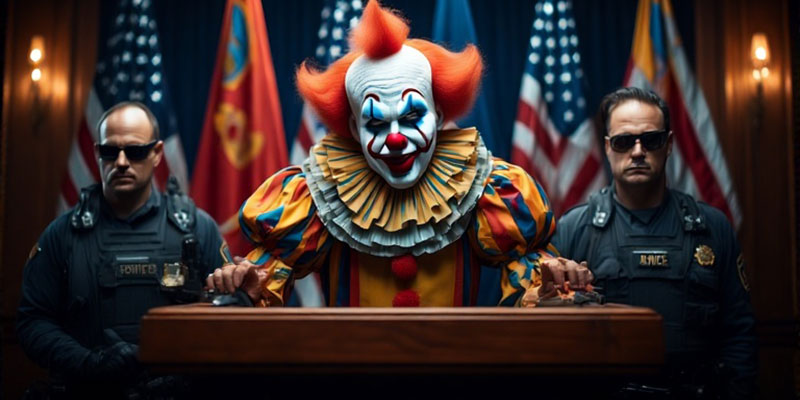In every corner of the modern world, from gilded palaces of government to the pulpits of cathedrals and temples, the illusion of leadership persists with remarkable resilience. People gather, listen, vote, pray, and protest — all in the belief that they are being guided by men and women of vision, principle, and divine or civic inspiration. But beneath the theater of power and faith lies a sobering possibility: that there are no true leaders at all, only skilled illusionists and their mesmerized audiences. This is not a cynical provocation for its own sake, but an increasingly defensible interpretation of global events and the personalities who shape them.
Political leaders present themselves as custodians of order, stewards of justice, and architects of a better tomorrow. They stand at podiums festooned with flags and emblems of national pride, speaking in practiced cadences, their speeches saturated with appeals to unity and righteousness. Yet, with unsettling frequency, their promises decay into self-serving policy, their rhetoric collapses under the weight of contradiction, and their moral authority reveals itself to be a carefully managed performance. The electorate, ever yearning for a savior in a suit, is often left disillusioned — until the next candidate emerges with a fresh coat of charisma and a new vocabulary of hope.
This cycle is not merely endemic to democracies. Authoritarian regimes, too, rely on the crafted myth of the strongman — a fatherly figure whose omniscience and iron will supposedly steer the nation through chaos. But behind the portraits and parades lies the familiar machinery of deception: controlled information, stage-managed appearances, and a public narrative meticulously sculpted by propaganda. The leader is not a leader in any noble sense; he is the central actor in a scripted drama designed to secure obedience. He does not illuminate a path forward; he simply ensures the lights stay focused on him.
Religion, too, has its own long history of shepherds and charlatans. For centuries, faith has been both the sanctuary of the oppressed and the playground of opportunists. From the gold-plated cathedrals of televangelists to the secretive hierarchies of spiritual gurus and cult leaders, the line between divine calling and naked grift has never been reliably clear. Leaders claim to speak with God, or to be gods, and millions follow — giving not just their devotion but their money, their autonomy, and often their lives. When the curtain is pulled back — revealing corruption, abuse, or fraud — the followers are left grappling with the disorientation of betrayal. But too often, rather than abandoning the illusion, they rationalize it, or seek out a new charismatic figure to follow.
This pattern — of deception and willing submission — speaks not just to the nature of those who rise to power, but to the psychology of the people who elevate them. Leadership, in its most mythologized form, may be less about wisdom and more about theater; less about courage and more about timing; less about the good of the many and more about the manipulation of the many by the few. The real power does not necessarily lie in the policies a leader enacts or the doctrines they preach, but in the performance of certainty in a world that constantly reminds us of our uncertainty.
It would be easy to dismiss this perspective as nihilistic, or even dangerous. After all, civilization requires some degree of organization and collective purpose. But recognizing the theatrical elements of leadership — the exaggerations, the illusions, the psychological manipulations — is not the same as advocating for anarchy. Rather, it is a call to interrogate the architecture of belief itself. Why do we so readily give our allegiance to those who seek it? Why are we comforted by the idea that someone knows what they are doing, even when all evidence suggests otherwise?
In some ways, the absence of true leaders is not a failure of society but a reflection of its deeper truths. The world is complex beyond comprehension, and no single individual — no matter how educated, spiritual, or magnetic — can truly master it. Yet, instead of admitting this, we construct myths around those who claim they can. The result is a culture of con artistry: of figures who sell certainty in times of chaos, morality in moments of moral ambiguity, and vision in a fog of competing interests.
To admit that there are no actual leaders is to wrest power back into the collective. It is to stop waiting for messiahs and start embracing the messy, uncomfortable, and often directionless work of true democracy and shared responsibility. It is to understand that leadership is not a crown to be worn but a set of choices made moment by moment, by people who may never stand behind podiums or command armies or claim to speak for God.
And so we face a choice. We can continue to elevate the cunning and the charismatic, mistaking their confidence for competence and their flair for truth. Or we can begin to dismantle the machinery of illusion — to expose the con and the conned alike — and build something less theatrical, but more honest in its uncertainty. In a world with no true leaders, the first act of liberation may simply be to stop looking for one.
